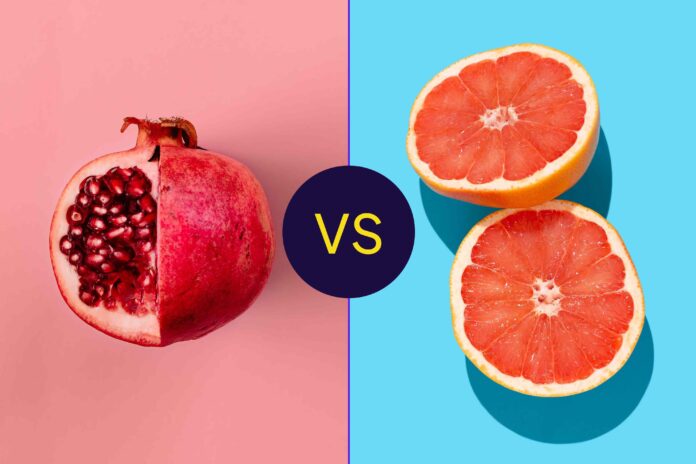Pomegranates and grapefruits are often touted as “superfoods,” rightfully earning their reputation for being packed with vitamins, minerals, and potent antioxidants. But when it comes to these cellular protectors, which fruit reigns supreme?
Let’s unpack the antioxidant benefits of both fruits and see how they stack up against each other.
Understanding the Antioxidant Forcefield
Antioxidants act as our body’s internal defense system against damage caused by free radicals. Imagine free radicals as unstable molecules generated through normal bodily processes and external stressors like pollution, sun exposure, or even a stressful day. When their numbers overwhelm our natural defenses, we experience oxidative stress – a state linked to chronic diseases such as heart disease, cancer, and neurodegenerative disorders.
Our bodies produce some antioxidants naturally, but we can significantly boost these defenses through our diet. Fruits, vegetables, spices, and certain supplements provide an array of antioxidant powerhouses: vitamins C and E, selenium, zinc, carotenoids, flavonoids, and omega-3 fatty acids are just a few examples.
Pomegranate: A Seed of Antioxidant Might
Pomegranates are nutritional superheroes, boasting exceptional antioxidant concentrations within their juicy seeds (also called arils). These little gems are brimming with polyphenols and flavonoids, including anthocyanins, ellagitannins, and organic acids.
Research indicates that drinking pomegranate juice can significantly reduce oxidative stress markers like malondialdehyde (MDA) in the body while simultaneously increasing total antioxidant capacity (TAC) – essentially giving your blood’s antioxidant reserves a boost. Pomegranates are also notable for their high vitamin C content, vital for immune function, healthy blood vessels, and collagen production.
Grapefruit: A Citrus Burst of Antioxidant Power
Grapefruit stands out as a champion citrus fruit for its impressive antioxidant profile. A single cup delivers nearly your entire daily dose of vitamin C, one of the most potent antioxidants known.
But grapefruit’s defense squad doesn’t stop there. It boasts flavonoid antioxidants like naringin and naringenin, working alongside carotenoids to combat oxidative stress and inflammation within the body. Studies even show that drinking grapefruit juice elevates blood levels of vitamin C and naringin, enhancing the blood’s ability to neutralize free radicals (measured as radical scavenging ability or RSA).
Regularly incorporating citrus fruits like grapefruit into your diet has been linked to a reduced risk of certain cancers and heart disease.
The Antioxidant Showdown: Who Wins?
The antioxidant champion title depends on how we measure it. Grapefruit emerges victorious based on its higher ORAC (Oxygen Radical Absorbance Capacity) score, indicating a greater capacity to neutralize free radicals. According to one study, grapefruit boasts an ORAC of 13,805 compared to pomegranate’s 9,046.
However, pomegranate takes the lead in delivering polyphenols – another powerful class of antioxidants known for their health-promoting properties.
Unfortunately, a direct comparison of total antioxidant content between the two fruits is lacking in current research.
The Verdict: A Delicious Draw
Both pomegranates and grapefruits are nutritional powerhouses brimming with unique antioxidant profiles and valuable nutrients. Incorporating both into your diet offers a winning strategy for boosting your overall health and well-being.
